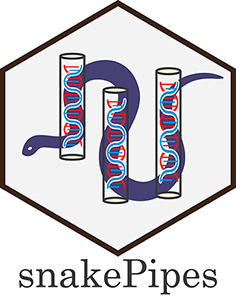snakePipes are flexible and powerful workflows built using Snakemake that simplify the analysis of NGS data.
- DNA-mapping*
- ChIP-seq*
- mRNA-seq*
- noncoding-RNA-seq*
- ATAC-seq*
- scRNA-seq
- Hi-C
- Whole Genome Bisulfite Seq/WGBS
(*Also available in "allele-specific" mode)
Snakepipes is a set of Snakemake workflows which use conda for installation and dependency resolution, so you will need to install conda first.
Afterward, simply run the following:
conda install mamba -c conda-forge && mamba create -n snakePipes -c mpi-ie -c bioconda -c conda-forge snakePipes
This will create a new conda environment called "snakePipes" into which snakePipes is installed. You will then need to create the conda environments needed by the various workflows. To facilitate this we provide the snakePipes commands:
conda activate snakePipesto activate the appropriate conda environment.snakePipes createEnvsto create the various environments.
Indices and annotations needed to run the workflows could be created by a simple command :
createIndices --genomeURL <path/url to your genome fasta> --gtfURL <path/url to genes.gtf> -o <output_dir> <name>
where name refers to the name/id of your genome (specify as you wish).
A few additional steps you can then take:
1. Modify/remove/add the organism yaml files appropriately : these yaml files would contain location of appropriate
GTF files and genome indexes corresponding to different organisms. The location of these files after installation can be
found using snakePipes info command.
2. Modify the cluster.yaml file appropriately : This yaml file contains settings for your cluster scheduler (SGE/slurm).
Location revealed using snakePipes info command.
For detailed documentation on setup and usage, please visit our read the docs page.
If you adopt/run snakePipes for your analysis, cite it as follows :
Bhardwaj, Vivek, Steffen Heyne, Katarzyna Sikora, Leily Rabbani, Michael Rauer, Fabian Kilpert, Andreas S. Richter, Devon P. Ryan, and Thomas Manke. 2019. “snakePipes: Facilitating Flexible, Scalable and Integrative Epigenomic Analysis.” Bioinformatics , May. doi:10.1093/bioinformatics/btz436
SnakePipes are under active development. We appreciate your help in improving it further. Please use issues to the GitHub repository for feature requests or bug reports.
